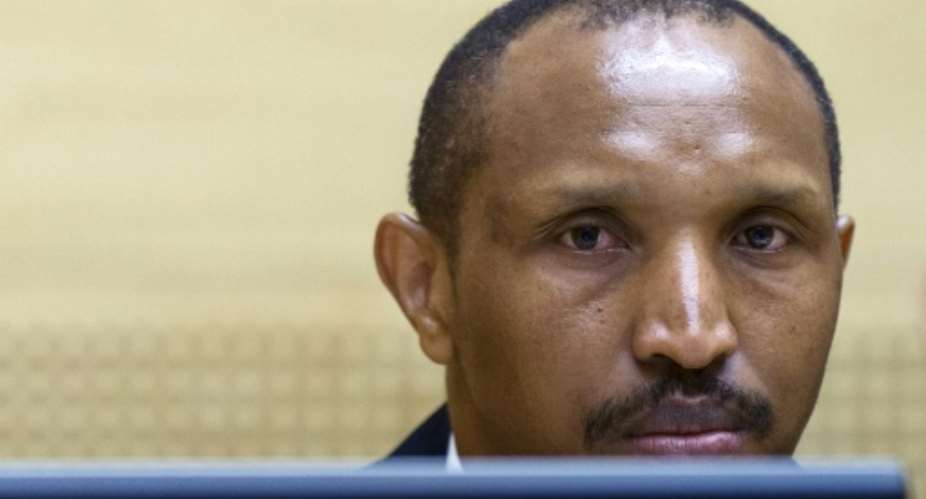The Hague (AFP) - Congolese former rebel leader Bosco Ntaganda was Monday on the 12th day of an unprecedented hunger strike in his detention cell in The Netherlands, refusing to attend his war crimes trial.
The once feared rebel leader from the Democratic Republic of Congo has not appeared in the courtroom at the International Criminal Court in The Hague since September 7.
He is the first defendant before the tribunal -- set up in 2002 to try the world's worst crimes -- to ever go on hunger strike and his protest is vexing judges who have ordered his trial must go on in his absence.
"How long can this situation last? Is it the kind of justice we want before the International Criminal Court?" said his lawyer, Stephane Bourgon, in a statement sent early Monday.
"We can't ignore the absence of the accused whose current state of health is rapidly deteriorating."
Ntaganda, who has been held in the ICC's detention unit in the seaside suburb of Scheveningen since he surrendered in 2013, has also told his lawyers to stop acting for him.
Once dubbed The Terminator, Ntaganda has denied 18 charges of war crimes and crimes against humanity arising out of savage ethnic attacks carried out in the DR Congo by his rebel Patriotic Forces for the Liberation of Congo (FPLC) in 2002-2003.
With Ntaganda again absent from the courtroom, Judge Robert Fremr said the detention centre's medical officer had reported early Monday that Ntaganda "shows fatigue, but no alarming physical or mental symptoms."
The medical officer had concluded Ntaganda was fit to be transferred to the courtroom to attend in his trial.
'Disruptive' actions
Fremr again denounced Ntaganda's actions as "disruptive", calling them "self-induced" and adding "the chamber sees no reasonable alternative but to continue the proceedings."
Ntaganda is protesting the judges' refusal to ease restrictions on his visitors -- imposed due to fears about witness tampering.
In a rambling statement read to the court last week, he said he had lost hope of ever seeing his wife and children again without the presence of court and security officials.
The standoff has left the court in a quandary, although ICC officials told AFP they would not force feed him.
"The court has an internal protocol that is being applied. Mr Ntaganda is being seen regularly by medical professionals and will not be force fed," the ICC said.
Ntaganda's trial opened in September 2015 after he walked into the US embassy in Kigali in 2013.
The eastern Democratic Republic of Congo has been mired for two decades in ethnically-charged wars, as rebels battle for control of its rich mineral resources.
Prosecutors say Ntaganda played a central role in the Ituri conflict in the far northeast which rights groups believe alone has left some 60,000 dead since 1999.





 April 20: Cedi sells at GHS13.63 to $1, GHS13.06 on BoG interbank
April 20: Cedi sells at GHS13.63 to $1, GHS13.06 on BoG interbank
 Dumsor: I'm very disappointed in you for messing up the energy sector — Kofi Asa...
Dumsor: I'm very disappointed in you for messing up the energy sector — Kofi Asa...
 Dumsor: Instruct ECG MD to issue timetable and fire him for lying — Kofi Asare t...
Dumsor: Instruct ECG MD to issue timetable and fire him for lying — Kofi Asare t...
 Ashanti region: Road Minister cuts sod for 24km Pakyi No.2 to Antoakrom road con...
Ashanti region: Road Minister cuts sod for 24km Pakyi No.2 to Antoakrom road con...
 Train crash: ‘How could any normal person leave a car on rail tracks?’ — Frankli...
Train crash: ‘How could any normal person leave a car on rail tracks?’ — Frankli...
 Train crash: Driver of abandoned vehicle not our branch chairman nor secretary —...
Train crash: Driver of abandoned vehicle not our branch chairman nor secretary —...
 Kenya pays military homage to army chief killed in copter crash
Kenya pays military homage to army chief killed in copter crash
 US agrees to pull troops from key drone host Niger: officials
US agrees to pull troops from key drone host Niger: officials
 Mahama vows to scrap teacher licensure exams, review Free SHS policy
Mahama vows to scrap teacher licensure exams, review Free SHS policy
 Government will replace burnt Madina shops with a new three-story, 120-store fac...
Government will replace burnt Madina shops with a new three-story, 120-store fac...
